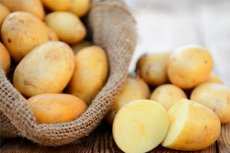New publications
Natural toxins in food: many people don't realize the health risks
Last reviewed: 02.07.2025

All iLive content is medically reviewed or fact checked to ensure as much factual accuracy as possible.
We have strict sourcing guidelines and only link to reputable media sites, academic research institutions and, whenever possible, medically peer reviewed studies. Note that the numbers in parentheses ([1], [2], etc.) are clickable links to these studies.
If you feel that any of our content is inaccurate, out-of-date, or otherwise questionable, please select it and press Ctrl + Enter.

Many people are concerned about chemical residues, pollutants or microplastics in their food. However, what is less well known is that many foods also contain toxins that are entirely natural. These toxins are often chemical compounds that plants use to protect themselves from predators such as insects or microorganisms. Such substances can be found in beans and potatoes, for example, and they can pose potential health risks.
However, according to a recent representative survey conducted by the German Federal Institute for Risk Assessment (BfR), only slightly less than half of respondents (47%) were aware of plant toxicants. A special edition of the BfR Consumer Monitor on naturally occurring plant toxins also showed that this risk is of concern to 27% of people.
At the same time, residues in food (e.g. from plant protection products) and contaminants, i.e. substances that are not intentionally added to food (e.g. heavy metals), are a concern for 63 and 62% of respondents, respectively.
"The survey results clearly show that risks of natural origin tend to be underestimated, while risks of synthetic origin tend to be overestimated," says BfR President Professor Andreas Hensel.
Raw plant foods are consumed frequently by 34% of people, sometimes or rarely by 45%, and very rarely or not at all by 19%.
What foods with natural plant toxins do you already know? If this question is asked openly and without prior selection, the first ones mentioned are potatoes (15%), then tomatoes, raw beans (9% each) and mushrooms (5%).
More than half of respondents (53%) believe they are poorly informed about plant toxins in food, while only 8% believe they are well informed.
Residues are the remaining amounts of substances used in food production. For example, residues may remain in fruits, vegetables, or grains even if plant protection products are used correctly.
Contaminants, on the other hand, are unwanted substances that accidentally end up in food. They may occur naturally in the environment, be created during the processing of raw materials into food, or be released into the environment as a result of human activity. Contaminants are unwanted because they can be harmful to health under certain circumstances.
The study also highlighted the related topic of "mouldy food." There is a clear need for education here, too. Even small amounts of mold toxins can be harmful to human and animal health. For example, moldy jam should always be thrown away completely.
However, 25% of respondents said that they only remove the moldy part. In the case of moldy berries, the affected and surrounding fruit should also not be eaten. Only 60% adhere to this rule.
